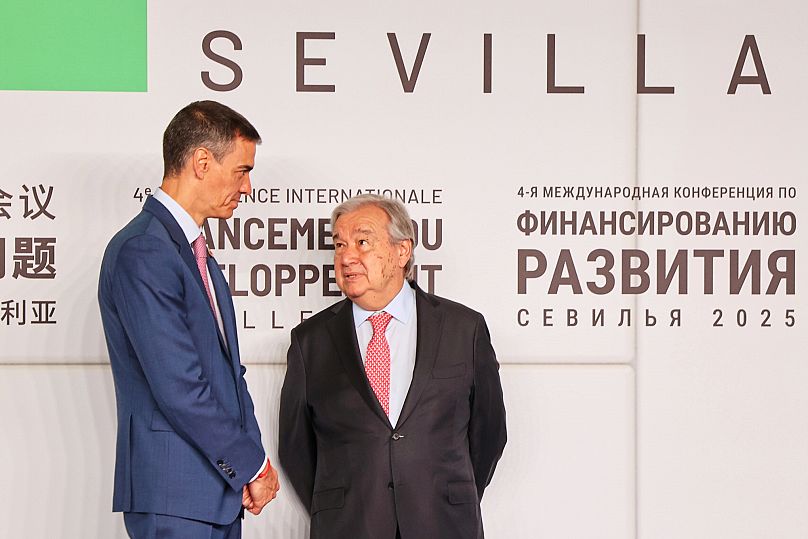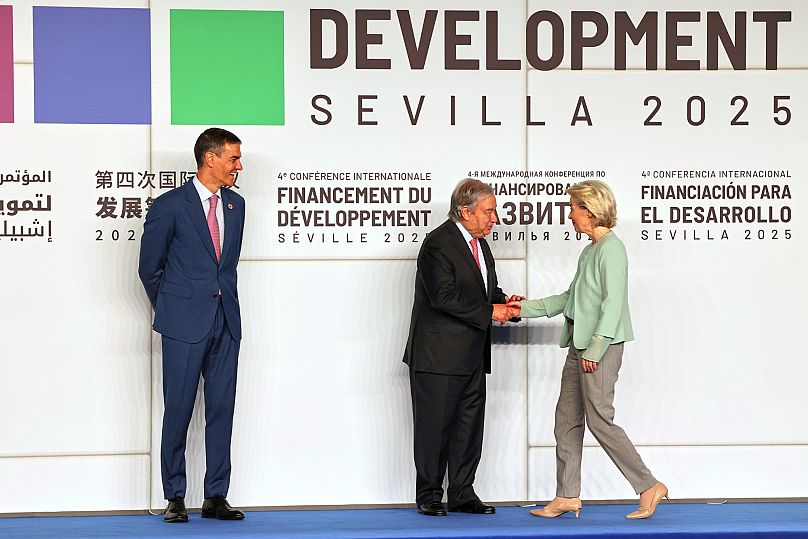Many of the world’s countries gathered in Spain on Monday, with the notable exception of the United States, in a bid to tackle the growing gap between rich and poor nations and try to drum up trillions of dollars needed to close it.
"Financing is the engine of development. And right now, this engine is sputtering," United Nations Secretary General Antonio Guterres said in his opening comments at the four-day Financing for Development meeting in Seville.
Many countries face escalating debt burdens, declining investments, decreasing international aid and growing trade barriers.
Co-hosts the UN and Spain believe the four-day meeting is an opportunity to close the staggering $4 trillion (€3.4 trillion) annual financing gap to promote development, bring millions of people out of poverty and help achieve the UN’s badly lagging Sustainable Development Goals for 2030.
Even though the gathering comes amid global economic uncertainty and geopolitical tensions, there is hope that the world can address one of the most important global challenges: ensuring all people have access to food, healthcare, education and water.
More than 70 world leaders attended, the UN said, along with representatives of international financial institutions, development banks, philanthropic organisations, the private sector and civil society.
Spanish Prime Minister Pedro Sánchez told the delegates that the summit is an opportunity "for us to raise our voice in the face of those who seek to convince us that rivalry and competition will set the tone for humanity and for its future."
Last-minute US rejection
At the last preparatory meeting on 17 June, the United States rejected the outcome document that had been negotiated for months by the UN’s 193 member nations and announced its withdrawal from the process and the Seville conference.
The Seville Commitment document, approved by consensus, will be adopted by conference participants without changes. It says delegates have agreed to launch "an ambitious package of reforms and actions to close the financing gap with urgency."
It calls for a minimum tax revenue of 15% of a country's gross domestic product to increase government resources, a tripling of lending by multilateral development banks and scaling up of private financing by providing incentives for investing in critical areas like infrastructure.
It also calls for reforms to help countries deal with rising debt.

UN trade chief Rebeca Grynspan recently said "development is going backward" and the global debt crisis has worsened.
Last year, 3.3 billion people were living in countries that pay more interest on their debts than they spend on health or education and the number will increase to 3.4 billion people this year, according to Grynspan.
And developing countries will pay $947 billion (€805 billion) to service debts this year, up from $847 billion (€720 billion) last year.
Angolan President Joao Lourenco, speaking for the African Group at the conference, said debt payment “consumes more resources than those allocated to health and education combined” for many countries.
US objections
While US diplomat Jonathan Shrier told the 17 June meeting that "our commitment to international cooperation and long-term economic development remains steadfast," he said the text "crosses many of our red lines."
He said those include interfering with the governance of international financial institutions, tripling the annual lending capacity of multilateral development banks and proposals envisioning a role for the UN in the global debt architecture.

Shrier also objected to proposals on trade, tax and innovation that are not in line with US policy, as well as language on a UN framework convention on international tax cooperation.
The United States was the world’s largest single founder of foreign aid before the Trump administration dismantled its main aid agency, the US Agency for International Development (USAID).
It drastically slashed foreign assistance funding, calling it wasteful and contrary to the Republican president’s agenda.
Other Western donors also have cut back international aid.
UN Deputy Secretary General Amina Mohammed last week called the US withdrawal from the conference “unfortunate,” adding that after Seville, "we will engage again with the US and hope that we can make the case that they be part of the success of pulling millions of people out of poverty."
On Monday, European Commission President Ursula von der Leyen reaffirmed the bloc's commitment to development financing, saying, "Our commitment is here to stay."







